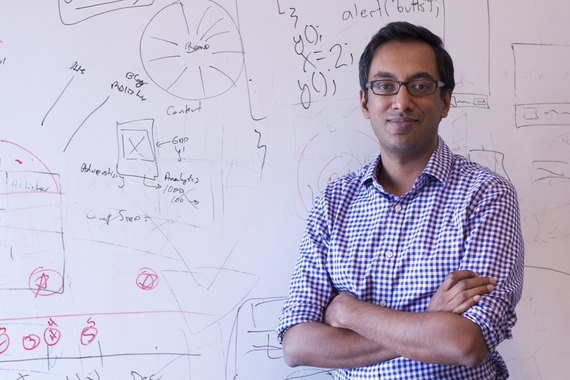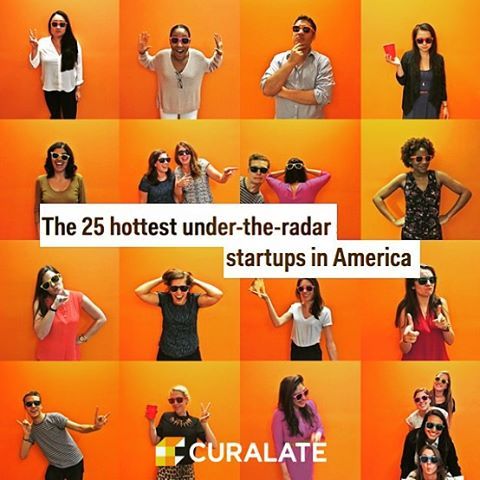Startup Insider is a series of articles with the goal of helping aspiring founders and entrepreneurs understand the ins and outs of starting a startup. We hope to dig deeper and showcase stories, advice and lessons from founders, investors and other key players in the growing startup ecosystem all over the world. You can sign up to stay up to date with this series here
Timing is one of the biggest factors when it comes to the success of startups. Sometimes, even if you have the best idea in the world, your startup ends up failing because it simply wasn't the right time and consumers simply weren't ready for it. Curalate CEO Apu Gupta understands both failure and timing better than most entrepreneurs.
Apu's experiences with failure and timing, with a little bit of luck led him to cofound Curalate, an image-analytics and marketing software that helps companies utilize images to drive sales. They currently have over 700 business clients, including well-known brands like Nordstrom, Michael Kors, Urban Outfitters, Gap, Target and more. They've raised over $12M, becoming one of the fastest growing Philadelphia startups.
While Curalate has become one of the hottest startups creating a whole new industry of image analytics, Apu's startup journey has been anything but ordinary. Apu and his cofounder Nick Shiftan along with early employee Brendan Lowry had to go through a pivotal period before arriving at Curalate.
I sat down with Apu to discuss his startup journey so far, how he got into entrepreneurship, lessons he has learned, the future of visual analytics and more.
Growing up in Silicon Valley
Growing up in Silicon Valley, Apu has always been interested in technology. He recalls, "I really companies like Apple because of their deep belief that they could really change the world."
At an early age, Apu would start learning about software development. He recalled, "What I loved about software [fundamentally] was that it had no limitations. It seemed like the only limitation was your brain. There were very few physical limitations. You kind of feel like you can build anything."
This early interest in technology would lead Apu to pursue a career in the tech industry as a product manager. However, Apu wanted to meet people outside of the tech industry as well.
He shared, "For all the talk about diversity in Silicon Valley, the one area where it wasn't that diverse was professional experience." Wanting to meet people from other industries, Apu decided to pursue his MBA at the Wharton School of Business.
From BSchool to Entrepreneurship
At Wharton, Apu would meet Madhukar Gangadi who convinced Apu to join him to start MedPlus, which would become the fastest growing and second largest pharmacy chain in India. While Apu initially decided to do consulting first after his MBA, he would eventually decide to fly to India, becoming the COO & CMO of MedPlus.
MedPlus would put an emphasis on growth, serving close to a million customers by their third year in operations. Apu recalled how no one in the MedPlus management team was a pharmacy guy; they were all tech and startup guys who wanted to grow a company really really fast.
He shared, "What I love about the tech industry besides creating the future, is that I work in the only industry in the planet where growing 80%-100% plus year over year is considered okay. We work in a hypergrowth industry. Everything we do is about growth. How do you grow as fast as you can possibly can. It's super stressful but it's also really fun."
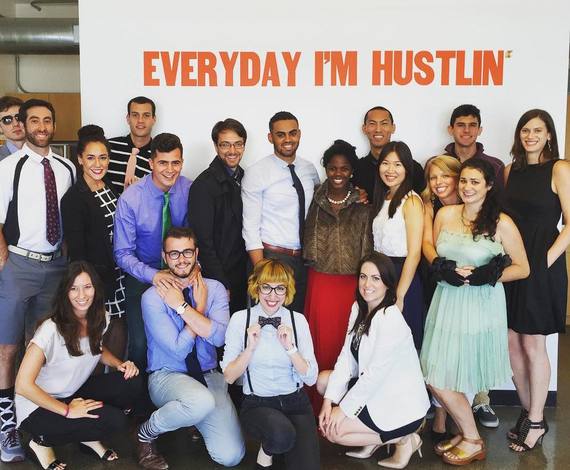 Fancy Formal Fridays at Curalate (Photo taken from Curalate Instagram)
Fancy Formal Fridays at Curalate (Photo taken from Curalate Instagram)
Back to the US - 'Odd Jobs'
After 3 years, MedPlus had grown to over 4000 employees. But Apu and his wife decided that it was time to move back to the US.
Apu shared, "I went back to the US right as the recession hit." Perfect timing?
He added, "I had this wonderful time in India. I built this really successful company back in India and I couldn't get a job in the US. I really wanted to work in tech but the tech industry wouldn't hire me because my background wasn't in tech anymore."
Apu's wife would end up getting a job in the East Coast while Apu had to settle for odd jobs. He tried out real estate private equity and tried to convince himself that he was a real estate guy. This was short-lived and after several other odd jobs, Apu knew he had to come up with something else.
If Apu couldn't get a tech job, he would make one for himself. Desperate to find a tech job, Apu decided that he would create the job instead by starting a tech startup so he went ahead and started going to networking session left and right. Fortunately enough, this would pay off as he would get connected to Nick Shaftan, who would end up becoming his cofounder.
Apu shared, "I got on a phone call with him and our interests aligned and we both wanted to build companies." This mutual appreciation would lead them to come together to work on their first startup idea: Storably, an AirBnB for driveway and basement storage.
Not as easy as you think
Apu and Nick would go to work, flying to the Valley and hitting Sandhill road with one pitch-deck, hoping that investors would take a bet on two smart guys who have a bit of background in starting a tech company. Apu shared, "For some unknown reason, these very well regarded investors said, we believe in you two."
They would end up receiving seed-funding from New Enterprise Associates, First Round Capital and MentorTech Ventures and they were off to the races. Heavily modeled after AirBnb, Storably received a lot of press upon launching. However, traction wouldn't come as easily. Apu shared, "It was a disaster. We tried so many different things for months. We even tried to expand to New York."
A bit discouraged with money burning every single day, Apu and the rest of the Storably team had to make a tough decision early on after realizing that there was no way they were going to hit the metrics their investors had set for them.
Apu shared, "We were very unemotional and very objective about thinking about the progress of our business and I think that was for me probably the single best thing we did."
While media highlights the story of all these entrepreneurs who persevere and stick with their idea no matter what, dropping Storably would turn out to be a blessing in disguise for Apu and the rest of the team.
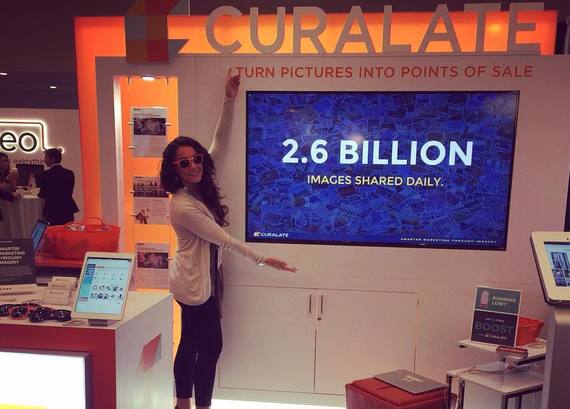 Curalate helps you turn the billions of photos shared daily into points of sale (Photo taken from lishaluuluu Instagram account)
Curalate helps you turn the billions of photos shared daily into points of sale (Photo taken from lishaluuluu Instagram account)
"We invested in you guys, figure something out"
After making the decision to close down Storably, Apu and the founding team decided to return the remaining investment to their investors. However, they would be met by this response, "We invested in you guys so go figure it out. Figure out what you want to do next but do it in a month."
With 30 days to figure out their life's passion, Apu, Nick and Brendan went to work, brainstorming and writing down all the ideas they had in a Google document. In 7 days, they would come up with 70 ideas that was shortlisted into 7, a few of which they decided to prototype and test out.
One of these ideas was DrinkedIn, a play on LinkedIn, that would match professionals with other professionals they could grab drinks with for networking. They built the landing page for DrinkedIn in 3 hours, integrating a simple sign up with LinkedIn button.
Apu shared, "There were all these glorious promises like, 'our algorithms would connect you to people like you'. In reality our algorithm was an intern and whenever you signed up, our printer would print your profile and our 21 year-old intern would connect people who had similar interests."
While DrinkedIn would receive international press and gain a pretty good amount of traction in a short amount of time, the team didn't really know how to turn it into a business. But this was a great confidence booster that would kickstart the team into picking the one idea that everyone in the team was passionate about.
The idea? An analytics tool for Pinterest that would end up becoming Curalate.
The Future of Image Analytics
As they started building the first prototype for Curalate, the team realized that this technology they were building wasn't just about Pinterest--it was about pictures.
Apu shared, "The insight we realized is that fundamentally consumers were beginning to communicate with pictures rather than words and that was really fascinating to us because if consumers start to communicate with pictures, the web itself was never engineered to parse pictures, it has always been made to parse text."
He added, "There is something very deep about the human experience that is rooted with imagery and what's fascinating about this is as people communicate more and more visually, the way that consumers learn about their world, about products, about experiences, about things that brands care about is through pictures."
These realizations were correct and Curalate has grown to work with over 700 brands from all over the world with a team of 95 employees running the show across offices in Philadelphia, New York and Seattle.
But how did Apu and his team know that this was the right idea? Timeliness.
Apu shared, "Every other idea we were looking at didn't need to be started today. If we didn't start DrinkedIn right now, DrinkedIn could be started later. If we had any hope of winning, it had to be started right now. The reason why is in tech, it is very rare that you get to start a company in a space that doesn't exist. Tech is a very competitive industry that most businesses that get started start by building a better mouse trap on something that already exists. That was not our case.
There was nothing in visual analytics and there was nothing in visual marketing that existed 3.5 years ago. We were the first, and that also motivated us."
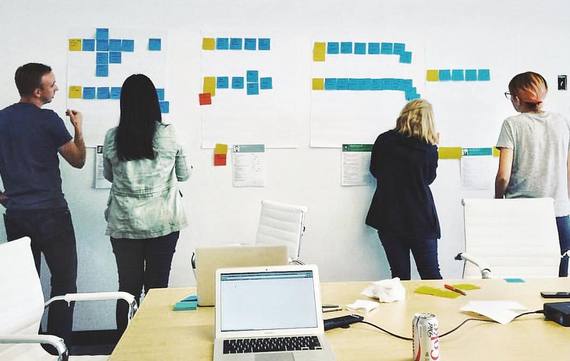 The Curalate Product and Design team working on the user journey (Photo taken from andyodore's Instagram account)
The Curalate Product and Design team working on the user journey (Photo taken from andyodore's Instagram account)
Tweeting Their Way to Success
While it took 6 months for Curalate to build their first product, multiple brands were already lined up for the service. How? Twitter.
Apu shared, "What we were able to do without necessarily having accurate data, was use directional data. And Brendan had this amazing idea to go after brands through Twitter."
Apu and Brendan would tweet to big brands saying, 'did you know that you are getting X amount of impressions on Pinterest in the last week?' Apu shared, "We couldn't be 100% sure that number was right but the reality was neither could they."
Because of this, 95% of the brands that they tweeted at ended up replying and asking if they could talk more about the service. Apu said, "We didn't know how to price it. But we knew that there was a market for it in a way that we never felt before. That's when we knew we had to go big with this."
Growing Pains
While Curalate seemed to hit product-market fit early on, Apu would face growing pains as Curalate was growing so quickly that they needed more people to handle all their customers.
Apu shared, "Now we had money and we had business coming into our door and we were doing well but we really didn't know who to hire. We didn't know what types of people made sense. We hired way too slow in the beginning. I can tell you with hindsight. As strong as our first year was in business, we could have been twice as strong if we leaned in more and hired more."
Eventually, Apu and the rest of the team had enough confidence in the business that they started expanding, opening an office in New York then Seattle.
The Amazing Thing About Entrepreneurship
Apu took some time to reflect upon his entrepreneurship journey before sharing with me a few of the milestones and things he enjoys about running Curalate.
He shared, "I find it such a privilege every single day that companies that have been around for 50 years that have built a brand that consumers love meet with us so we can come educate them and meet with them and help them improve their business through the software we're creating."
This software that Curalate produces has evolved over the years, building more functionality and becoming more consumer facing.
Apu shared, "All of a sudden, we weren't just touching thousands of brands, we were directly touching millions of consumers every single day. We had millions of users interacting with software and things we were putting on web pages."
"Startups aren't just a lot of time. It's also a lot of mental time"
Apu shared, "Even when I'm not here physically in the office, I'm always thinking about it and that's difficult for other people. All of a sudden, you lose all of your interests and you become less interesting to people. I have to put a lot of time into this, which means over time, I'm less interesting to some people and that's hard and it's a big sacrifice. There are enormous sacrifices that you pay for this like your health, friends and other interests."
Apu added, "People try to make startups look sexy but there is nothing sexy about startups. I just wish people would stop glamorizing over startups because there is nothing cool about this. There are these outlier stories where startups come out of nowhere and get bought for millions of dollars but they're rare. They do happen but the vast majority of this is a lot of work."
While startups aren't as sexy as people believe, Apu still finds fulfillment in growing Curalate, hoping that one day, the Curalate employees will become successful entrepreneurs as well.
Apu shared, "It's messy and infuriating at times but it's incredibly rewarding. For both my cofounder and I, the biggest reward isn't a financial reward. To us the biggest reward would be if we can instill within our employees the skills needed to become the next generation of successful entrepreneurs. Our organization is all about insights and giving people insights and educating them. I want to see a lot of entrepreneurs come out of this. Just like how there is a Paypal mafia, I want to see a Curalate mafia. You know, maybe one day, we'll produce the next Elon Musk."
Want to learn more about Curalate? Check out their founders' story video below and visit their website here.
---About the Author---
David Ongchoco is a student entrepreneur and avid storyteller from the Philippines studying at the University of Pennsylvania majoring in what he likes to call, LIFE. He is currently working on expanding his for-purpose organization YouthHack. It's David's goal to make an impact in the lives of as many people possible while constantly learning new things every single day. If you have any interesting startup stories, David can be reached via Twitter @DOitChoco. You can also email startupinsider.official@gmail.com.
